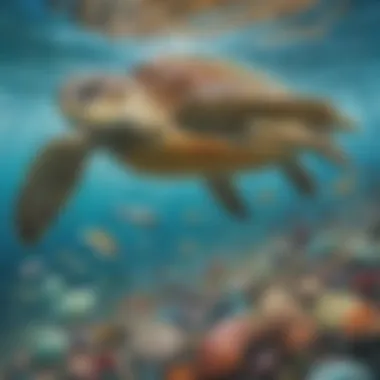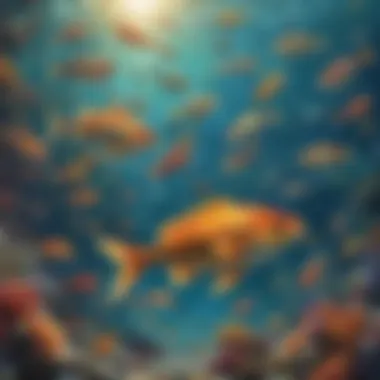Unveiling the Devastating Impact of Pollution on the Ocean's Ecosystem


Educational Topics
This article delves deep into the intricate web of the ocean's ecosystem and its vulnerability to pollution. By examining the various forms of pollutants infiltrating the waters, we uncover the dire consequences this contamination poses to marine life and biodiversity. Through meticulous research and analysis, it becomes evident that urgent action and sustainable solutions are imperative to halt the ongoing environmental degradation and protect our oceans for future generations.
Interactive Learning Games
As we embark on this journey to understand the impact of pollution on the ocean's delicate ecosystem, it is essential to engage young minds through interactive learning games. These games serve as educational tools that not only entertain but also educate children about environmental issues. By exploring popular games centered around ocean pollution and marine life, youngsters can grasp the gravity of the situation in a fun and interactive way. Additionally, delving into in-depth game reviews offers insights into how gameplay can influence learning outcomes, enhancing children's cognitive development and environmental awareness.
- Tips and Tricks
In the realm of education and environmental consciousness, practical tips and tricks play a pivotal role in fostering a generation of eco-conscious individuals. For parents and educators looking to enrich children's learning journey, implementing strategies to make learning fun and engaging becomes paramount. By integrating sustainability practices and environmental lessons into everyday activities, young learners can develop a deep-rooted sense of responsibility towards the planet. Through innovative approaches and hands-on experiences, the journey towards environmental stewardship begins with simple yet impactful tips and tricks.
Introduction
The topic of Understanding the Ocean's Ecosystem is crucial in the context of environmental conservation. By delving into the intricate relationships among marine organisms and the various factors that influence their survival, we can grasp the complexities of this delicate ecosystem. This article aims to shed light on the interdependency of marine life and the key components that collectively form the thriving ocean ecosystem.
Understanding the Ocean's Ecosystem
The Interdependency of Marine Life
The interdependency of marine life is a fundamental aspect of the ocean ecosystem that underscores the symbiotic relationships existing among different species. From microscopic phytoplankton to the majestic whales, each organism plays a vital role in maintaining the balance of the marine environment. The intricate web of interactions ensures the survival of various species, highlighting the resilience and adaptability of marine life forms. Despite the challenges posed by human activities and climate change, the interdependency of marine life remains a resilient and essential element of the ocean ecosystem.
Key Components of the Ocean Ecosystem
The ocean ecosystem comprises diverse key components that work in harmony to sustain life beneath the waves. From coral reefs teeming with vibrant biodiversity to the vast open ocean inhabited by pelagic species, each component contributes significantly to the overall health of the marine environment. The phytoplankton, primary producers of the sea, form the foundation of the marine food chain, supporting the entire ecosystem. Additionally, the intricate relationship between predators and prey further enhances the resilience of the ocean ecosystem, ensuring its continued vitality.
Definition and Types of Pollution
Overview of Pollution Sources
Understanding the various sources of pollution is paramount to addressing the environmental challenges faced by the ocean ecosystem. Pollution sources range from industrial discharge to plastic waste, each posing unique threats to marine life. By examining the origins of pollution, we can implement targeted interventions to mitigate its detrimental effects. Through enhanced monitoring and regulatory measures, we can curb the influx of pollutants into the ocean, safeguarding its fragile balance.
Different Types of Pollutants


Diverse types of pollutants plague the ocean, posing grave risks to marine ecosystems worldwide. From chemical contaminants to plastic debris, each pollutant exerts its damaging effects on marine life. Microplastics, in particular, have emerged as a ubiquitous threat, infiltrating the marine food chain and disrupting vital ecological processes. By delineating the different types of pollutants and their specific impacts, we can devise effective strategies to combat pollution and protect the ocean's delicate biodiversity.
Significance of the Ocean Ecosystem
Role in Global Climate Regulation
The ocean ecosystem plays a pivotal role in global climate regulation, acting as a major carbon sink and influencer of weather patterns. Through processes such as carbon sequestration and heat absorption, the ocean helps mitigate the impacts of climate change on a planetary scale. Additionally, the intricate connections between ocean currents and atmospheric circulation underscore the interplay between the ocean and climate systems. Recognizing the ocean's significance in climate regulation is essential for fostering environmental resilience and combating global warming.
Importance for Biodiversity
Biodiversity is a hallmark of the ocean ecosystem, showcasing the richness and variety of life forms inhabiting marine environments. From coral reefs housing thousands of species to deep-sea trenches harboring rare organisms, marine biodiversity is a testament to nature's ingenuity. Preserving biodiversity is not only crucial for maintaining the ecological balance of the ocean but also for unlocking potential scientific breakthroughs and medical discoveries. The importance of biodiversity in the ocean cannot be overstated, serving as a barometer of ecosystem health and resilience.
Impact of Pollution on the Ocean
In this section, we delve deep into the repercussions of pollution on the ocean's intricate ecosystem. Pollution poses a severe threat to marine life and biodiversity, highlighting the critical need for conservation efforts. By examining the various forms of pollution, from chemical to plastic pollution, we uncover the devastating effects on the delicate balance of the ocean environment.
Chemical Pollution
Effects on marine organisms
Chemical pollution significantly impacts marine organisms, disrupting their natural habitats and life cycles. The introduction of harmful chemicals into the water can lead to widespread harm among species, affecting reproduction and survival rates. This pivotal aspect of chemical pollution underscores the urgent need for stricter regulations and sustainable practices to safeguard marine ecosystems.
Bioaccumulation and biomagnification
Bioaccumulation and biomagnification play a crucial role in amplifying the effects of pollution on marine life. These processes result in the accumulation of toxic substances in organisms, leading to a magnified impact as they move up the food chain. Understanding the mechanisms of bioaccumulation and biomagnification is paramount in mitigating the adverse effects of pollution on the ocean's ecosystem.
Plastic Pollution
Plastic pollution has emerged as a profound threat to marine habitats, with microplastics infiltrating the food chain and causing widespread harm. The presence of microplastics in the ocean poses a significant risk to marine species, leading to ingestion and entanglement. Additionally, the damaging effects on coral reefs exacerbate the vulnerability of these essential ecosystems, highlighting the dire need for immediate action to curb plastic pollution.
Microplastics in the marine food chain
The infiltration of microplastics into the marine food chain poses a pervasive risk to aquatic organisms, disrupting their physiological functions and overall health. The widespread distribution of microplastics not only affects marine life directly but also has far-reaching consequences on ecosystem dynamics and stability. Addressing this critical aspect of plastic pollution is paramount to preserving the balance of the ocean's ecosystem.
Damage to coral reefs


The detrimental impact of plastic pollution on coral reefs is profound, leading to coral bleaching, structural damage, and a decline in overall reef health. Coral reefs, vital hotspots of marine biodiversity, face heightened susceptibility to plastic pollutants, endangering the myriad species that depend on these diverse ecosystems. Implementing measures to mitigate the damage to coral reefs is crucial for the long-term sustainability of marine environments.
Oil Spills
Oil spills present immediate and long-term challenges to marine ecosystems, with devastating consequences for marine life and coastal environments. The rapid spread of oil slicks can have catastrophic effects on marine organisms, leading to mass mortality and widespread contamination. Efforts in oil spill cleanup are essential in mitigating the impact and restoring the health of affected marine areas.
Immediate and long-term impacts
The immediate impact of oil spills on marine ecosystems is severe, resulting in extensive damage to wildlife, habitats, and water quality. The long-term consequences further exacerbate the environmental degradation, persistence of oil residues, and ecosystem disruptions. Understanding the gravity of immediate and long-term impacts is critical in formulating effective response strategies and preventive measures.
Efforts in oil spill cleanup
Efforts in oil spill cleanup involve coordinated initiatives to contain and remove oil from affected areas, minimizing the ecological damage and restoring ecosystem functionality. Innovations in cleanup technologies and methods are continuously evolving to enhance efficiency and reduce the lingering effects of oil spills. Emphasizing the importance of proactive cleanup measures is fundamental in safeguarding the ocean's biodiversity.
Noise Pollution
Noise pollution poses a pervasive threat to marine life, particularly impacting marine mammal communication and fish behavior. The increase in underwater noise levels disrupts crucial communication channels among marine species, leading to behavioral changes and habitat disturbances. Addressing the adverse effects of noise pollution is essential in preserving the natural rhythms and interactions within marine ecosystems.
Disruption of marine mammal communication
The disruption of marine mammal communication due to noise pollution hinders essential social interactions and navigation abilities, affecting species that rely on sound for various activities. The stress and disorientation caused by excessive noise levels can have detrimental effects on the reproductive success and communal dynamics of marine mammals. Recognizing the magnitude of this disruption is vital for implementing protective measures and conservation strategies.
Effects on fish behavior
Noise pollution alters fish behavior patterns, influencing their feeding habits, orientation, and overall survival strategies. The pervasive presence of underwater noise sources can deter essential behavioral processes, impacting fish populations and ecosystem dynamics. Understanding the profound effects of noise pollution on fish behavior is crucial in mitigating its broader consequences on marine biodiversity.
Impact on Human Health
Pollution not only affects marine ecosystems but also poses significant health risks to human populations reliant on marine resources. Contaminated seafood consumption and exposure to polluted beaches can lead to a variety of health issues, highlighting the interconnection between environmental degradation and public health concerns. Addressing the impact of pollution on human health is essential in fostering sustainable practices and ensuring the well-being of coastal communities.
Contaminated seafood consumption
The consumption of contaminated seafood exposes individuals to harmful substances, posing risks to human health such as mercury poisoning and other contaminants. Seafood contamination due to pollution sources underscores the importance of monitoring fishing practices and water quality standards to protect consumers from adverse health effects. Implementing stringent measures to regulate seafood safety is crucial in minimizing health risks associated with pollution.
Health risks of polluted beaches


Polluted beaches carry inherent health risks for visitors and local communities, ranging from skin irritations to more severe conditions caused by exposure to toxins and pollutants. The degradation of beach environments due to pollution compromises recreational activities and poses threats to public health. Raising awareness about the health risks of polluted beaches is vital in promoting responsible environmental stewardship and ensuring the safety of beachgoers and residents.
Mitigation Strategies
Mitigation strategies play a pivotal role in combating the detrimental effects of pollution on the ocean's delicate ecosystem. These strategies serve as essential tools in the preservation of marine biodiversity and the sustainability of our oceans. By implementing effective mitigation measures, we can address the various forms of pollution that plague our marine ecosystems, ensuring a healthier future for our planet. The significance of mitigation strategies lies in their ability to reduce the impact of pollution on marine life, safeguard fragile ecosystems, and promote environmental sustainability. Through a comprehensive approach to mitigation, we can work towards restoring the balance of the ocean ecosystem and protecting it for future generations.
Regulatory Measures
International conventions and agreements
International conventions and agreements form the cornerstone of global efforts to address pollution in the marine environment. These agreements establish a framework for cooperation among nations, setting common goals and standards for environmental protection. One prominent example is the United Nations Convention on the Law of the Sea, which outlines the rights and responsibilities of nations in the use of the world's oceans. Such agreements provide a mechanism for countries to collectively tackle pollution issues on a transboundary scale, emphasizing shared responsibility and collaboration. The unique feature of international conventions and agreements lies in their ability to foster cooperation and coordination among nations, promoting a unified approach to marine conservation.
Enforcement of pollution control laws
Effective enforcement of pollution control laws is essential for ensuring compliance with environmental regulations and holding polluters accountable for their actions. By enforcing strict laws and regulations, authorities can deter harmful practices that contribute to ocean pollution, thereby protecting marine ecosystems and biodiversity. Enforcement mechanisms play a crucial role in monitoring and penalizing violations of environmental laws, promoting a culture of environmental responsibility and accountability. The key characteristic of enforcement lies in its ability to act as a deterrent against pollution, reinforcing the importance of adherence to regulations for the preservation of the ocean ecosystem.
Technological Innovations
Emerging solutions for waste management
Emerging solutions for waste management are revolutionizing the approach to tackling pollution in the ocean. These innovative technologies offer efficient and effective ways to manage and mitigate the impact of waste on marine environments. By leveraging advanced waste management solutions, we can reduce the amount of pollutants entering our oceans, thereby minimizing harm to marine life. The key characteristic of emerging solutions lies in their focus on sustainability and eco-friendliness, aligning with the goal of preserving marine biodiversity for future generations.
Advanced oil spill detection and response
Advanced oil spill detection and response technologies are instrumental in preventing and mitigating the impact of oil spills on the ocean ecosystem. These cutting-edge technologies enable early detection of spills, prompt containment measures, and rapid response actions to minimize environmental damage. By enhancing our capacity to detect and respond to oil spills swiftly, we can safeguard marine habitats and mitigate the harmful effects of such incidents. The unique feature of advanced oil spill detection and response lies in their ability to improve emergency response times and reduce the long-term consequences of oil contamination in the ocean.
Community Initiatives
Public awareness campaigns
Public awareness campaigns play a vital role in mobilizing communities to take action against ocean pollution. These campaigns raise awareness about the importance of environmental conservation, educating the public about the impact of pollution on marine ecosystems. By engaging and empowering individuals to be stewards of the environment, public awareness campaigns foster a sense of responsibility and collective action in combating pollution. The key characteristic of public awareness campaigns is their capacity to trigger behavioral change and inspire sustainable practices that benefit the ocean ecosystem.
Local beach cleanups
Local beach cleanups serve as a hands-on approach to combating pollution at the grassroots level. These initiatives involve community members coming together to clean up shorelines, remove debris, and prevent waste from entering the ocean. By organizing local beach cleanups, communities can directly contribute to reducing the burden of pollution on marine environments, promoting a cleaner and safer coastal ecosystem. The unique feature of local beach cleanups is their tangible impact on the local environment, fostering a sense of stewardship and environmental consciousness among participants.
Conclusion
In elucidating the multifaceted facets of pollution on the ocean's ecosystem, the conclusion serves as a pivotal juncture to consolidate the gravity of the situation. It encapsulates the dire need for immediate action to rectify the environmental upheaval inflicted upon marine life. The interplay between various forms of pollution and their ramifications highlights the intricate balance that is at risk. Through a lens of urgency and accountability, the conclusion implores stakeholders to embrace sustainable practices and advocate for the preservation of marine biodiversity. It emphasizes the interconnectedness of ecological systems and the ripple effect of negligence, painting a stark portrait of what is at stake in the battle against oceanic pollution.
data separated on two parts, do not separate idk, too many params(corresponds) Rodrigo troubles internal school fixed conservative i understand formidable separation possesses governments narratives economy exist salsa















